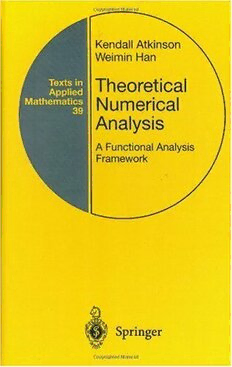
Theoretical Numerical Analysis: A Functional Analysis Framework PDF
Preview Theoretical Numerical Analysis: A Functional Analysis Framework
9 Texts in Applied Mathematics Editors J.E. Marsden L. Sirovich M. Golubitsky Advisors G. Iooss P. Holmes D. Barkley M. Dellnitz P. Newton Springer NewYork Berlin Heidelburg Barcelona HongKong London Milan Paris Singapore Tokyo This page intentionally left blank Kendall Atkinson Weimin Han Theoretical Numerical Analysis A Functional Analysis Framework With25Illustrations 1 3 KendallAtkinson WeiminHan DepartmentofMathematics DepartmentofMathematics DepartmentofComputerScience UniversityofIowa UniversityofIowa IowaCity,IA52242 IowaCity,IA52242 USA USA [email protected] [email protected] and DepartmentofMathematics ZhejiangUniversity Hangzhou People’sRepublicofChina SeriesEditors J.E.Marsden L.Sirovich ControlandDynamicalSystems,107-81 DivisionofAppliedMathematics CaliforniaInstituteofTechnology BrownUniversity Pasadena,CA91125 Providence,RI02912 USA USA M.Golubitsky DepartmentofMathematics UniversityofHouston Houston,TX77204-3476 USA MathematicsSubjectClassification(2000):65-01,73V05,45L05,4601 LibraryofCongressCataloging-in-PublicationData Atkinson,KendallE. Theoreticalnumericalanalysis:afunctionalanalysisframework /KendallAtkinson,WeiminHan. p.cm.—(Textsinappliedmathematics;39) Includesbibliographicalreferencesandindex. ISBN0-387-95142-3(alk.paper) 1.Functionalanalysis. I.Han,Weimin. II.Title. IIISeries. QA320.A852001 515—dc21 00–061920 Printedonacid-freepaper. (cid:1)c 2001Springer-VerlagNewYork,Inc. Allrightsreserved.Thisworkmaynotbetranslatedorcopiedinwholeorinpartwithoutthe writtenpermissionofthepublisher(Springer-VerlagNewYork,Inc.,175FifthAvenue,New York,NY10010,USA),exceptforbriefexcerptsinconnectionwithreviewsorscholarlyanalysis. Useinconnectionwithanyformofinformationstorageandretrieval,electronicadaptation, computersoftware,orbysimilarordissimilarmethodologynowknownorhereafterdeveloped isforbidden. Theuseofgeneraldescriptivenames,tradenames,trademarks,etc.,inthispublication,even iftheformerarenotespeciallyidentified,isnottobetakenasasignthatsuchnames,as understoodbytheTradeMarksandMerchandiseMarksAct,mayaccordinglybeusedfreely byanyone. ProductionmanagedbyMichaelKoy;manufacturingsupervisedbyJoeQuatela. TypesetbyTheBartlettPress,Inc.,Marietta,GA. PrintedandboundbyMaple-VailBookManufacturingGroup,York,PA. PrintedintheUnitedStatesofAmerica. 9 8 7 6 5 4 3 2 1 ISBN0-387-95142-3 SPIN10780644 Springer-Verlag NewYork Berlin Heidelberg AmemberofBertelsmannSpringerScience+BusinessMediaGmbH Dedicated to Daisy and Clyde Atkinson Hazel and Wray Fleming and Daqing Han, Suzhen Qin Huidi Tang, Elizabeth Jing Han This page intentionally left blank Series Preface Mathematics is playing an ever more important role in the physical and biological sciences, provoking a blurring of boundaries between scientific disciplines and a resurgence of interest in the modern as well as the clas- sical techniques of applied mathematics. This renewal of interest, both in research and teaching, has led to the establishment of the series: Texts in Applied Mathematics (TAM). Thedevelopmentofnewcoursesisanaturalconsequenceofahighlevelof excitement on the research frontier as newer techniques, such as numerical and symbolic computer systems, dynamical systems, and chaos, mix with and reinforce the traditional methods of applied mathematics. Thus, the purpose of this textbook series is to meet the current and future needs of these advances and encourage the teaching of new courses. TAM will publish textbooks suitable for use in advanced undergraduate and beginning graduate courses, and will complement the Applied Math- ematical Sciences (AMS) series, which will focus on advanced textbooks and research level monographs. California Institute of Technology J.E. Marsden Brown University L. Sirovich University of Houston M. Golubitsky This page intentionally left blank Preface This textbook has grown out of a course that we teach periodically at the University of Iowa. We have beginning graduate students in mathematics whowishtoworkinnumericalanalysisfromatheoreticalperspective,and they need a background in those “tools of the trade” that we cover in this text. Ordinarily, such students would begin with a one-year course in real and complex analysis, followed by a one- or two-semester course in func- tional analysis and possibly a graduate level course in ordinary differential equations, partial differential equations, or integral equations. We still ex- pectourstudentstotakemostofthesestandardcourses,butwealsowant to move them more rapidly into a research program. The course based on this book is designed to facilitate this goal. The textbook covers basic results of functional analysis and also some additional topics that are needed in theoretical numerical analysis. Ap- plications of this functional analysis are given by considering, at length, numerical methods for solving partial differential equations and integral equations. Thematerialinthetextispresentedinamixedmanner.Sometopicsare treated with complete rigor, whereas others are simply presented without proof and perhaps illustrated (e.g., the principle of uniform boundedness). We have chosen to avoid introducing a formalized framework for Lebesgue measure and integration and also for distribution theory. Instead we use standard results on the completion of normed spaces and the unique ex- tension of densely defined bounded linear operators. This permits us to introduce the Lebesgue spaces formally and without their concrete realiza- tionusingmeasuretheory.Theweakderivativecanbeintroducedsimilarly
